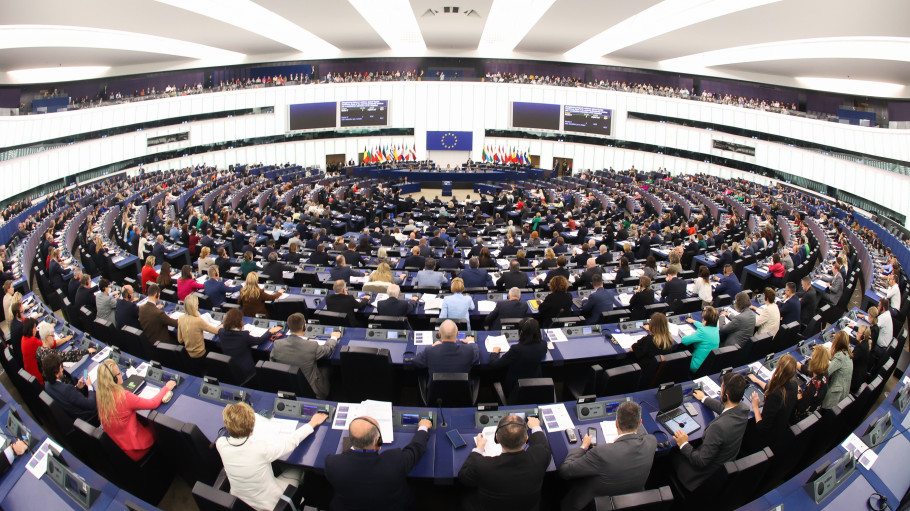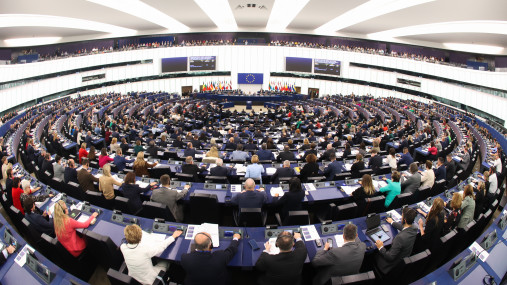
Press releases » Steel crisis in focus at EP Plenary debate: urgent need for robust EU Steel Action Plan, says EUROFER
Steel crisis in focus at EP Plenary debate: urgent need for robust EU Steel Action Plan, says EUROFER
Downloads and links
Recent updates

Brussels, 22 October 2024 – The steel crisis will be at the centre of the European Parliament (EP) Plenary sitting tomorrow morning in Strasbourg. Members of the European Parliament (MEPs) will debate how to tackle the dire situation facing the European steel industry and its workers, caused by global steel overcapacity, unfair trade, low demand in the manufacturing industry and high energy prices in the EU. This public discussion raises high expectations for a fit-for-purpose EU Steel Action Plan to be implemented swiftly to save the sector as the basis for EU manufacturing, underscores the European Steel Association.
“We welcome the European Parliament’s acknowledgment of the dramatic conditions the European steel industry currently endures. This timely debate called by MEPs is essential for raising broader awareness of the existential challenges we are confronting and for proposing effective, comprehensive solutions to implement swiftly within an EU Steel Action Plan”, said Axel Eggert, Director General of the European Steel Association (EUROFER). “There is no time to lose: global excess capacity is wiping out sustainable steel production in the EU along with the quality jobs that support all our manufacturing value chains. European steelmakers’ investments in clean steel production are at risk, as is the EU’s resilience in cleantech value chains, from wind to automotive. What is at stake is not just steel or the steel business, but the very backbone of the EU economy and people’s livelihood”, he stressed.
The latest data highlight the substantial collapse of the global steel market and its disruptive impact on the European steel sector:
· Global steel excess capacity reached 551 million tonnes in 2023 - four times more than the EU annual steel production - and continues to grow. According to the OECD, an additional 157 million tonnes of mainly very carbon intensive capacity are in progress by 2026.
· Steel production in the EU has been shrinking by over 30% since 2008 to 126 million tonnes in 2023.
· Restructuring and capacity reduction processes have resulted in a loss of nearly 100,000 jobs in the EU steel industry over the last 15 years.
· Capacity utilisation in the EU has recently dropped to unviable levels of around 60%.
In a letter sent ahead of last week’s European Council meeting, the CEOs representing the European steel industry urged EU leaders to take immediate action, notably to:
• Strengthen EU Trade Defence Instruments to stop unfair trade practices and propose a structural solution to mitigate the impact of worsening global excess capacity.
• Improve the Carbon Border Adjustment Mechanism (CBAM) to prevent circumvention, resource shuffling and delocalisation of downstream sectors, while preserving EU steel exports.
• Reduce energy costs for industries such as steel that are exposed to significant global competition and secure access to raw materials while retaining steel scrap within the EU.
• Establish lead markets to drive demand for green steel in Europe.
“We count on the European Parliament to ensure that a robust European Steel Action Plan addressing all these concerns is proposed and implemented soon, in good cooperation with all the social partners”, concluded Mr. Eggert.
Photo: © European Union - 2024
Contact
Lucia Sali, Spokesperson and Head of Communications, +32 2 738 79 35, (l.sali@eurofer.eu)
About the European Steel Association (EUROFER)
EUROFER AISBL is located in Brussels and was founded in 1976. It represents the entirety of steel production in the European Union. EUROFER members are steel companies and national steel federations throughout the EU. The major steel companies and national steel federation of Turkey, Ukraine and the United Kingdom are associate members.
The European Steel Association is recorded in the EU transparency register: 93038071152-83.
About the European steel industry
The European steel industry is a world leader in innovation and environmental sustainability. It has a turnover of around €191 billion and directly employs around 303,000 highly-skilled people, producing on average 140 million tonnes of steel per year. More than 500 steel production sites across 22 EU Member States provide direct and indirect employment to millions more European citizens. Closely integrated with Europe’s manufacturing and construction industries, steel is the backbone for development, growth and employment in Europe.
Steel is the most versatile industrial material in the world. The thousands of different grades and types of steel developed by the industry make the modern world possible. Steel is 100% recyclable and therefore is a fundamental part of the circular economy. As a basic engineering material, steel is also an essential factor in the development and deployment of innovative, CO2-mitigating technologies, improving resource efficiency and fostering sustainable development in Europe.

Joint Industry Statement
Brussels, 11 February 2026 - The European Steel Association (EUROFER) has backed a call to action adopted by European companies and industries in Antwerp today, which includes a demand on the EU to take urgent action to bring electricity prices down as a condition for Europe’s industrial drive, competitiveness and economic resilience.
The automotive value chain is of vital importance to the EU steel industry and requires an integrated approach to realising the decarbonisation transition in a pragmatic way.